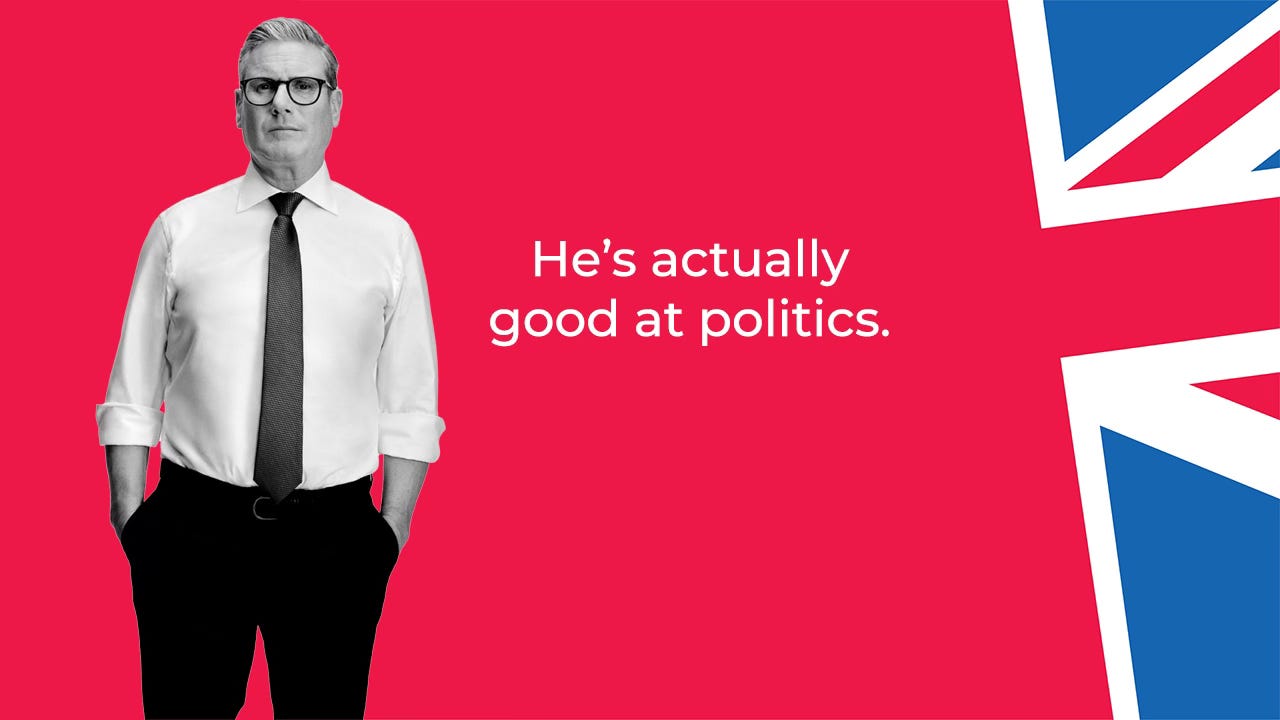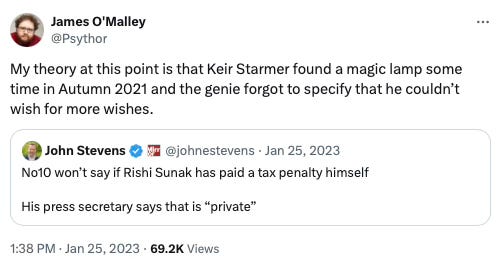Keir Starmer is extremely good at politics
Power, not protest
It’s extraordinary to think back to the desolation of 2019. The election was Labour’s worst result since 1935, and it felt like the nadir in what would be, at best, a torturous two or three term process to drag the party back into contention.
And yet here we are today, with Keir Starmer installed inside Number 10, sitting on top of a majority that rivals Tony Blair’s 1997 victory.
It’s an amazing moment. Sure, we know from the bitter lived experience of the last 14 years that it isn’t true that Things Can Only Get Better – but now we also know that it is possible to push the pendulum back in the right direction.
And what’s important is how it was done.
Over on Twitter, an app where I waste far too much of my life, my extremely niche claim to fame is that I’m the person who first coined the meme that Labour’s success is because in Autumn 2021, Keir Starmer found a magic lamp – and that the genie inside forgot to specify that he couldn’t wish for more wishes.
Since my initial tweet, the meme has become a regular running joke, and all over British Politics Twitter, you can find people making cracks whenever a damaging scandal takes down one of Starmer’s political opponents, or whenever a rival party is thrown into chaos.
But now that Starmer has won the election I can tell you the truth.
I do not believe in genies.
Though Starmer has been incredibly lucky, and over the last few years has found himself with the right politics at the right time in history, his astonishing victory today is not because of a genie.
It’s due to an incredible amount of political skill on his part.
This is because unlike Labour’s previous regime, Starmer understood the rules of the game he was playing – and worked hard to optimise his party to win within them.
He understood that you can only fight elections with the electorate you’ve got – not one that you can choose. And if he wanted to win a majority and form a government, he knew that he would have to make political choices and push Labour outside of its ideological comfort zone, so that the party could reach voters who do not instinctively share its values. And you don’t have to follow Labour politics too closely to know that this was a hugely controversial thing to do on the left of the party.
In fact, a narrative that is already fermenting on social media is to compare the popular vote shares in the 2019 and 2024 elections. In terms of raw numbers, the number of people voting for Labour across the country actually fell – from 10.3m to 9.7m. This is ‘proof’ that voters are not enthusiastic for the Starmer project, or somehow evidence that today’s spectacular landslide is not as meaningful as 2019’s devastating loss.
But the reality is that none of this matters, because winning the popular vote is not the game. The game is to win constituencies under First Past the Post. Keir Starmer understood this, and executed on a strategy to optimise the party to win seats – not applause at rallies.
So in a sense, though it felt surprising last night to see Labour lose seats on its left flank – to Gaza activists, the Green Party, and the former leader – it perhaps shouldn’t have been. It was the inevitable consequences of a strategic trade-off that Starmer made. He chose to optimise Labour for the policies and positions that would appeal to voters across the 412 constituencies the party won today, rather than the nine or so on the left that it didn’t.
And to be clear, if you share my politics some of these choices are genuinely frustrating. For example, I’m a hardcore Remainer, I was a strong believer in the £28bn climate investment pledge, and I think HS2 must be completed in full.
But the reality is that my views – and those of people further to my left – are eccentric relative to those of most people, in most places. Most voters are reflexively sceptical of building slightly taller buildings, let alone smashing capitalism.
So to win the game with the electorate that Labour was actually playing, trade-offs had to be made, and ultimately, they were exactly the right decisions to make, because now that Labour has won – and has won big – Starmer gets to claim the prize that has eluded his party since 2010: The opportunity to implement at least some of its ideas and spend five years reshaping Britain in its image.
This means that though Labour will not be doing everything that I want, by being in Downing Street instead of standing outside of its gates holding a placard, Starmer will actually be in a position to deliver the good, progressive ideas outlined in its missions.
For example, it will accelerate, rather than decelerate decarbonising the grid (even if the timeline is wildly optimistic). It will reform the planning laws to build more homes and grow the economy. It might even make it so that you can get a doctor’s appointment without having to phone up bang on 8 o’clock and then have to wait two weeks. Instead of posturing on the sidelines, while the Conservatives make everything worse, it will be in power, moving Britain in a direction that I actually like.
And compared to what we’ve had for the last 14 years? With no genie to snap its fingers, I’ll take this progress over what we had before. With Labour in power, rather than out of power, then things will only get better – albeit incrementally. And it’s all because Keir Starmer is extremely good at politics.
If you’re a milquetoast centre-left melt like me, then you’ll like my newsletter, where I write about politics, policy, tech and media. Subscribe now (for free!) to get my takes in your inbox.





The vote share point is really annoying because the Labour vote share is not independent of the Tory vote share (and vice versa). Corbyn may have motivated people to vote for him, but unfortunately he also motivated many people to vote against him - which is why although he got a higher vote share than Starmer, May and Johnson both got higher vote shares than him and he lost two elections. Motivation works both ways!
Totally agree. I think it’s really hard for a lot of left wing people to get their head around the fact that the electorate is not going to get magically more left wing just because we want them to. I was raised by a “Ken Clarke liberal” (his words) and I always look at politicians and think, would my dad have voted for them? I think he’d have been very tempted by Keir Starmer (and repulsed by the Tory scandals). So, yes, he’s probably played it very safe (arguably too safe), and a lot of left wing people are now convinced he’s a Tory, but he’s also in 10 Downing Street. Let’s hope he doesn’t waste the opportunity.